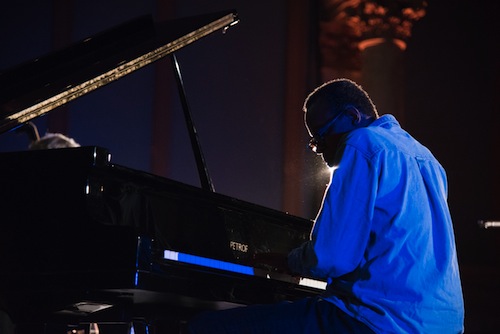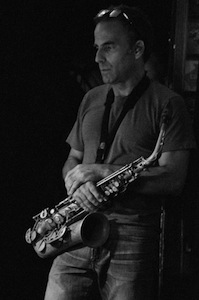By Filipe Freitas
Matthew Shipp, 2017 ©Clara Pereira
Name: Matthew Shipp
Instrument: piano
Style: contemporary jazz, modern creative
Album Highlights: Pastoral Composure (Thirsty Ear, 2000), Equilibrium (Thirsty Ear, 2003), Piano Song (Thirsty Ear, 2016)
You have two fresh records coming out on ESP-Disk label in February, one solo (Zero) and one in quartet (Sonic Friction).
What's the concept behind Zero?
There is no concept behind Zero except for a questioning of the same metaphysical concepts that have always been what I ask - How things come out of nothing? How poles of energy cohere into events and things? And the polarity between the abyss and the manifested. The abyss has always interested me and the poles of desire that the universe uses to make diversity come out of unity, so the universe can get to know itself, which it cannot by being the one entity it is. Also, the invisible glue that holds the world together is a fascination of mine. This is where I was at when I recorded the CD.
By listening to it, one can easily identify classical and blues elements. They are used, not in their traditional forms, but always as vehicles for your creative process. Which are your main influences/inspirations in these currents?
I don’t think in terms of genre. I think in terms of fields of energy that sort of manifest as language or what you might call a genre, so, classical music per-se does not interest me, but many classical composers touch on the ideas I like, and they interest me for that reason, not for the fact that they are classical composers. The language fields that have meant something to me are Bach, Chopin, Joplin, Webern, Debussy, etc. It's more the idea of a language field that interests me. I like Xenakis as far as math being a language along with the music. As far as blues goes, the blues is a field of resonance, and I don’t know if I have any specific influences within the blues language, but it is connected to a feeling and an emotion and though I play space blues like Sun Ra. I still have an interest in the field, and resonance, hence the blues.
Sonic Friction marks the fourth collaboration with Mat Walerian. How did you guys meet and who first had the idea of recording?
Mat Walerian contacted an old agent of mine. I originally did not want to work with him, mainly because I am not at a point of enlarging the sphere of people I play with. However, he used as a reference Hamid Drake, who he had done some playing with, and Hamid told me he thought we would be great together. So, based on Hamid's recommendation, I did a concert with Walerian. When I first shook hands with him, I knew we would really hit it off and it just happened. Things just took on a life of its own after that.
Walerian and Ivo Perelman are your frequent collaborators, but different sound explorers. In your point of view, what do they bring to your music in order to enrich it?
Ivo Perelman and Walerian are completely different animals. Both of them mean a lot to me. First of all, they are from different generations. Ivo is my age, and since we are the same generation, we tend to have a very similar worldview and way of going about things. Walerian is a whole different, pole of energy, and to some extent he was shaped by my generation, despite the fact that he obviously is influenced by some of the same people I am, like Coltrane, etc.
Ivo, in some ways, postures himself in ways like David S. Ware and Charles Gayle would, in a certain tradition of a tenor hero, whereas Walerian does not posture himself as a sax hero. I'm not sure how I would word his posture, but it's different and a new form and mode of presentation plus he has found a really unique and unpretentious way of wedding his Zen and martial arts philosophy to the music. What both have in common is a real honesty about who they are. Both are very honest and completely unpretentious. They are vibrant for that reason plus their talents.
You had electronics, synth, and programming added to some of your past albums such as Nu Bop and Equilibrium. What are your thoughts about the use of technology in music?
I have no thoughts about electronica in jazz. I did it for a while and, at that time, it was perfect for what I was exploring and I am glad I did some projects like that, but as far as what others are doing, they have to do what is right for them and, in most cases, if they are doing it, I assume it's because it needs to be done. At this point, I am weeded to acoustic jazz for myself.
What else besides music interests you?
Interests other than music: metaphysics, fighting (boxing and martial arts), politics, history, literature. All kinds of things actually. This is a rich world. No one should ever be bored. If you are, it's your fault.
As a prolific creator, are you happy with the current music business? What would you change immediately if you had that power?
I do not feel the music industry is headed to a good place, but I don’t feel too good about many things in society. I have serious problems with streaming. I am glad I made my name in industry days before what we have now. There are so many things about modern culture that are very shallow and virtual or not really real. People have some serious soul searching to do about values that are solid and real, and in some ways, the way things have gone do not facilitate the values I think are important. I hope things do not have to crash before people are forced to reevaluate a lot of things. The music industry has no center today. It takes incredible persistence and willpower to cut a niche out for yourself in the middle of all the noise out here. It has always been like that but culture has seemed to have taken a dip down. Of course, there are tons of talented people with something to say out here, but there is some nasty haze over everything these days, so, an artist has to be really concentrated in their own source code.
What was the first jazz record you fell in love with?
The first jazz album that really interested me was Phineas Newborn Jr.'s Solo Piano.
Can you name two persons whom you've never collaborated with but you would like to?
Kool Keith and Ikue Mori. I would also love to play with the great saxist James Spaulding.
You have found your own voice. What's your advice for the ones who are still trying to find theirs?
I feel lucky that I found my voice. Don’t know what to say to people who ask how. You have to really trust yourself. How you do that, I don’t know. You must have an intense desire to have your own voice, you must have the poetic vision to follow your own demons and thought forms. Hopefully, you can draw on something primal that you knew as a 3-year-old. Of course, at that time, you would have had no way to articulate what you knew on an instrument or in any other form, but there are secrets in nature that we are aware of as kids that are educated out of us at a later date. You need to find some way to break down the layers of socialization that were thrust upon you by society and to find your primal self.
Any other projects for 2018?
Concerts with my trio, solo, and with Ivo Perelman. There might be a film also, more on that later.






